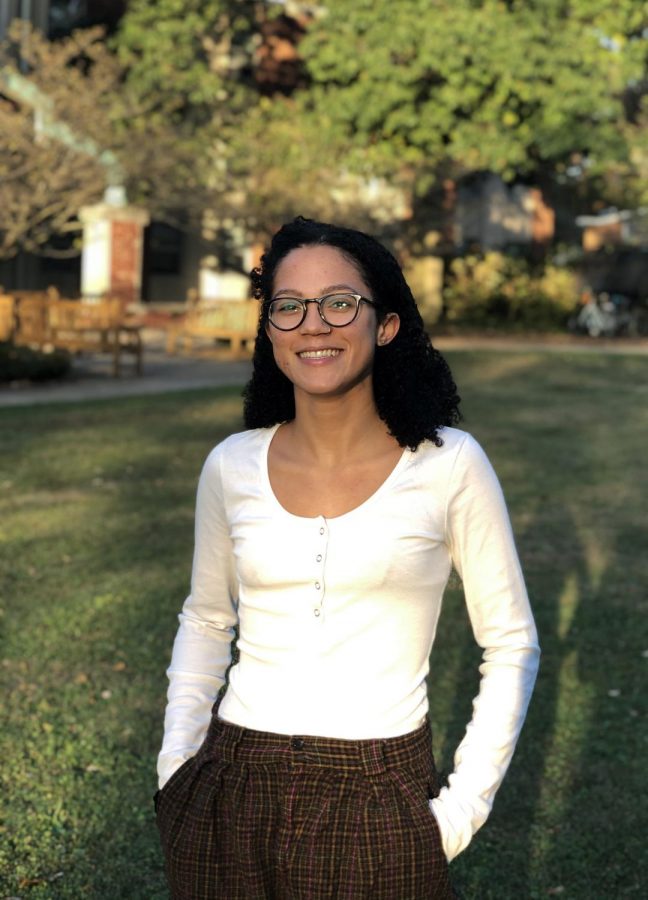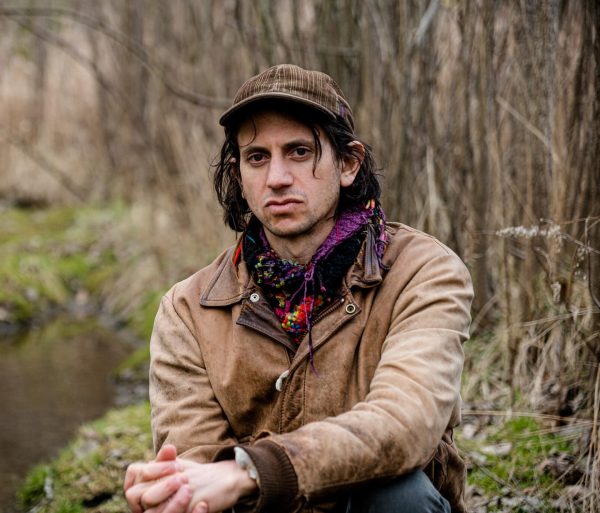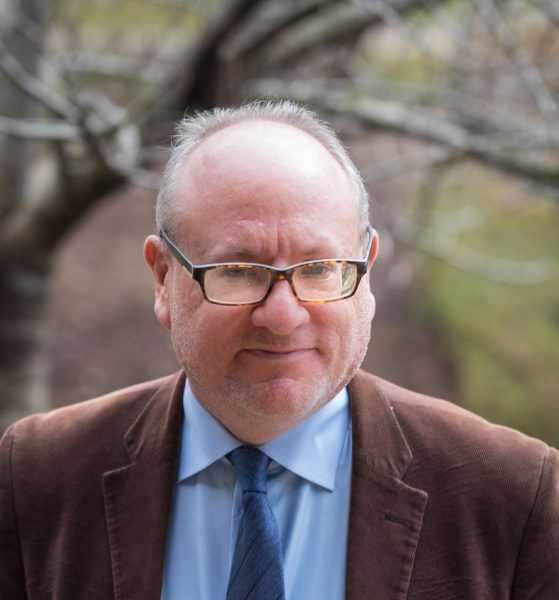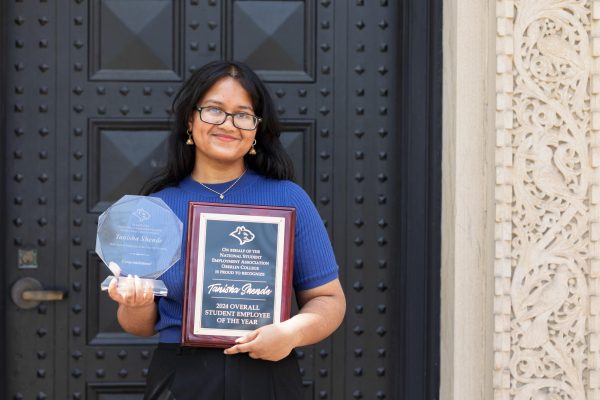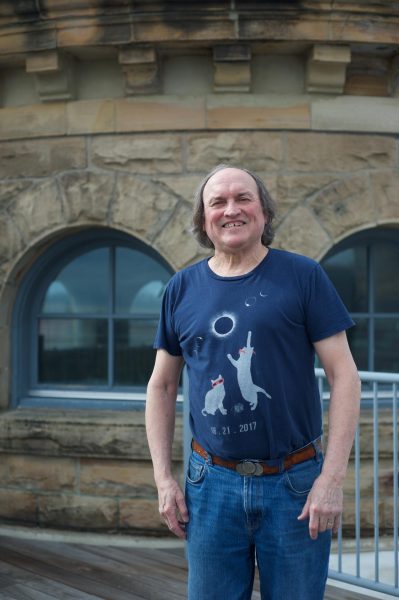Off the Cuff: Gio Donovan, College Third-Year and OSCA President
College third-year Gio Donovan is the Oberlin Student Cooperative Association president. In addition to leading OSCA, Donovan works at the ’Sco and is majoring in Africana Studies. As president, Donovan is responsible for maintaining the relationship between OSCA and the College, as well as managing negotiations between the association and the administration. Among other accomplishments, Donovan has read Where the Wild Things Are more than a thousand times.
This interview has been edited for length and clarity.
So you just became OSCA president this year. When did you first get involved in OSCA?
This story actually starts three or four years ago, during [the] spring of my junior year of high school. I came to tour Oberlin, and I stayed with two friends that were in the class of 2018 and were my old camp counselors. They lived in Tank [Hall]. We went to a show in the basement of Harkness. I ended up becoming friends with the people that were in that band after I came here as a student. But we went to a show in the basement of Harkness, and then we had meals in Tank all weekend. I stayed in one of the turret rooms. It was a great experience, and I started to realize on [other] visits I had been [on] so far with colleges … I was missing the sense of strong community that I found when I was staying [at Oberlin].
Can you talk about what you love about this organization and what you want for its future?
My “Why Oberlin” supplement [essay] is almost entirely about why OSCA was the reason I wanted to come to Oberlin. I knew once I got into Oberlin, I had to be in OSCA. I started out living and dining in Harkness. [At] the end of my [first] year, I moved to [Third World co-op], and my [second] year I became the sexual harm information liaison. The appointments process started at the end of the spring of my [first] year. I was like, “Oh, I’m very passionate about [this work] personally, and I can do it and get paid, which is really cool. But I can also give back to this community — that is entirely why I’m here.” Being the sexual harm information liaison and working on a lot of Title IX stuff is part of why I really wanted to be president, because I started to dig into policy and OSCA. [I went to] all these all-staff meetings and got an idea of what it actually takes to run OSCA.
So in the fall of last year, I ran for president, and I was elected. I spent a lot of the spring in meetings with my predecessors — the officers — and the other incoming officers preparing for the [Academic and Administrative Program Review] stuff to be released. I would join them for their rent contract negotiations [with the College].
I think I saw then a lot of what next year would be like for me. … In general, a president of an organization should be thinking about the long term and not just a short, one-year term. I guess for all-OSCA, it’s different because we have one-year terms … Hopefully we can get stuff from the past 50 years of OSCA and think about [the future of] OSCA. The goal of my presidency is to identify ways that OSCA can be in a place where it’s financially thriving and ideally self-sustainable and independent from the College.
That’s what our goal is in these long-term conversations. Also, my own personal goal is [to] make sure every staff person feels very supported. I have check-ins every month or so with every single all-OSCA staffer. If I could, I probably would [meet with every person in OSCA], but I don’t think everyone wants to sit down and talk to me about how they’re doing.
What’s a typical day in the life of the OSCA president?
I will not do anything — I will wake up at 5 a.m. if I need to do stuff at 6 a.m. — until I have my hour of peace, because I always start my day off with making my coffee and sitting in my room and reading a little bit. If I don’t do that, I already know the rest of my day is going to suck. I need to have a chill start because I know I tend to have very hectic days, so I carve out that little bit of peace for me, which is very nice. There’s a lot of dancing in my room with my headphones on at that time, too.
And then usually if I’m not going right to class, I go to the OSCA office. If I don’t have class that day — like Monday, Wednesday, Friday — I tend to go to the office around 10 or 11 a.m. I have a lot of regularly-scheduled meetings that continue throughout the week. Our general management team meetings and personnel committee and [other meetings] are set every week. Sometimes I’ll go to the office and I’ll be like, “This is my plan for the day, this is what I’m going to tackle.” And sometimes things will just come up, whether it’s someone from a co-op is coming into the office and they’re like, “Oh, Gio, I’m going to talk to you about this.” It’s hard to think about my day to day as president because it’s never consistent.
How does your job as OSCA president compare to your job at the ’Sco?
Those are two wildly different jobs. I’ve been working in the ’Sco for [around] two weeks now. I love working at the ’Sco. I also love working as OSCA president. I love both of these things so much. I don’t say they compare; I think they’re equally as good, if I’m being honest, and probably [equally] fulfilling. I think OSCA is fulfilling in the sense of all the hard work I do for this community I really care about, and I’m also getting all this great work experience and having a good time.
I think working at the ’Sco is just really fun. For example, at Splitchers on [Wednesday] I was working, and all of us were just singing and dancing behind the bar and would just run out and go dance, too. Or when I was sitting there and giving out wristbands, I kept singing along to “Hey Ya” while sitting with Shirley [Sikora], also known as Mama ’Sco. It’s just a very, interestingly enough, wholesome work environment.
Outside of the day-to-day, what does it mean to you to run a co-op?
I was food safety coordinator my [first-year] fall in Harkness. It was not really fun to do commandos and deep-clean an industrial kitchen. I’m not going to say that it was a glamorous, fun experience. Or being a SHIL — it wasn’t a glamorous and fun experience to be on call 24-7 and be a support person. It was great, but it wasn’t like, “Oh my God, this is so fun.”
All the positions I’ve had within OSCA so far, but also just being in co-ops, I think — and this is going to sound really weird — but OSCA has taught me to be nice. I feel like I’ve created such intimate connections with people. You’re literally taking care of and helping sustain each other, and you spend so much time [together in] close quarters.
It made me appreciate the people I was around so much more. … Even people who I’m not really close to, I have so much deep love for them because I’m like, “Oh, I don’t know you as a person that well, but I know Tuesday dinner, when this person’s head cooking, it’s going to be the best meal of my life and I’m going to leave feeling so cared for.” And that’s what’s great.


